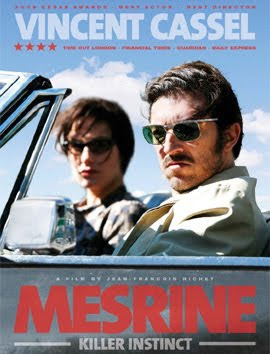 While some critics dinged the episodic rough ride offered up by part one of the two-film biopic based on Jacques Mesrine's (may-reen) autobiography, the French flick carries a gritty rawness fitting of the period. And the roughness of it all lends well to capturing the character of this circa 1960-70s outlaw tied to 32 bank heists and several maximum security prison breaks (for starters).
While some critics dinged the episodic rough ride offered up by part one of the two-film biopic based on Jacques Mesrine's (may-reen) autobiography, the French flick carries a gritty rawness fitting of the period. And the roughness of it all lends well to capturing the character of this circa 1960-70s outlaw tied to 32 bank heists and several maximum security prison breaks (for starters).There are plenty of people to credit in this film, but much of the praise belongs to French actor Vincent Cassel (Black Swan). His portrayal is galvanizing in that he makes Mesrine ruthless with threats, aloof in murder, believable in his conviction, and even honorable and compassionate when the mood strikes him. At times you feel sympathetic, until being reminded he is a killer.
The slash and hack story of Jacques Mesrine
The film, subtitled for Americans, is based largely on L'Instinct de Mort, which was written by Mesrine and published two years before his death. That is not to say that the film doesn't take some liberties, such as placing one arrest in Texas or Arizona as opposed to Fulton, Ark. But regardless, the first installment spans his life from 1956 to 1969.
With the exception of showing us how it all ends, the film mostly starts while Mesrine still serving in the French Army during Algeria's war for independence. He then returns to France and begins a career as a burglar and bank robber. He doesn't go it alone. He joins childhood friend Paul (Gilles Lellouche) and Guido (Gérard Depardieu).
At first blush, the early criminal introduction is caper-esque as Mesrine convinces an elderly couple, who walk in while their home is being burgled, that he and Paul are police investigating a crime that has already occurred. The same can be said for the memorable, tensely comedic meeting between him and Guido. And again when he earns the affection of his future wife Sophia on the dance floor.
The counterbalance is rough and violent. He callously stabs and buries someone while still alive. He threatens to places a gun in his wife's mouth after she protests his return to crime. He kills two rangers in Canada without remorse or blinking an eye.
The film is equally abrupt at times.
The abrupt scene changes are jarring at times. Neither writer Abdel Raouf Dafri nor director Jean-François Richet seem to have any patience for builds, which is where all the episodic complaints germinate. Perhaps the most abrupt introduction is of Jeanne Schneider (Cécile De France), the Bonnie to his Clyde.
It's 1966 Paris and Mesrine walks into a bar. He randomly meets Jeanne who says she is ready for anything. Blip. They rob a nightclub. Blip. They've become a couple. Blip. They flee to Canada. And so on. Sure, it is jarring and yet somehow it fits.
Mesrine is equally adept with charm and brutality. He can flip the switch anytime, unabashed at making it his world.
The real life Jacques Mesrine.
 The real Mesrine was equally complicated. Perhaps it would not be unfair to describe him as an intelligent psychopath who won over the media with a relentless justification. He frequently told them he was mostly interested in exploiting those who exploited others.
The real Mesrine was equally complicated. Perhaps it would not be unfair to describe him as an intelligent psychopath who won over the media with a relentless justification. He frequently told them he was mostly interested in exploiting those who exploited others. Although it makes him sound more noble than he was, there may be some truth to it. Mesrine didn't seem to be chasing money as much as the means he used to get it. While not in the film, he did open a restaurant in 1966, but still robbed a jewelry store and hotel that same year. He was motivated by something else.
This is one of several reasons I've rolled my eyes at all the Dillinger comparisons. Dillinger frequently avoided fire fights and loathed killing. Mesrine seemed to look for them and had no remorse. Dillinger had no prospects for employment. Mesrine sought out crime. Dillinger was cold but approachable. Mesine was charming but with a temper like Tommy DeSimone.
Mesrine: Killer Instinct Breaks Out With A 6.9 On The Liquid Hip Richter Scale.
Mesrine: Killer Instinct (originally L'instinct de Mort) took two years to make it to the United States, which is far too long. Still, the delayed U.S. release doesn't dull any fascination with the film. Mesrine is something to marvel at as an anti-hero without concern for consequence, thanks largely to Cassel, Richet, and cast.
Mesrine: Killer Instinct is available on iTunes. The second part, Mesrine: Public Enemy #1, will be available on March 21. Mesrine: Killer Instinct: Part 1 is also at Amazon and the film is available at Barnes & Noble. Some booksellers occasionally list L'Instinct de Mort, which is the book the film is based on (written in French).
![Liquid [Hip]](https://blogger.googleusercontent.com/img/b/R29vZ2xl/AVvXsEjAFBQPqS7J0-rrttNoRYSsuwIePPZf4Nq6sqDioK1zzVQXJIQXKzq_NVNI4n6h3inuRQFBKOcJeZeSufkdHHIOxbSWyBjTjTxgKEQGyPzdwvkEEeECh4bI5YEGk4RWGUINSd7vulPQsCA/s1600-r/liquidhip.jpg)